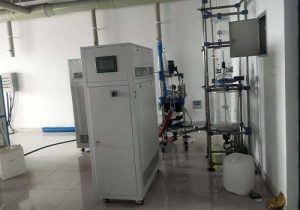difference between air cooled chiller and water cooled chiller
The Distinction Between Air-Cooled and Water-Cooled Chillers
Industrial processes often require precise temperature control to ensure efficiency and product quality. Chillers play a crucial role in these processes by providing cooling solutions. Chillers can be categorized into air-cooled and water-cooled systems, each with its unique characteristics and applications.

Working Principles
Air-Cooled Chillers: These chillers use ambient air to dissipate heat. They operate by compressing refrigerant, which then passes through an evaporator where it absorbs heat from the process fluid. The hot refrigerant gas is then cooled in the condenser by fans that blow air over the condenser coils, rejecting the heat to the atmosphere. Finally, the refrigerant passes through an expansion valve, where it expands and cools before returning to the evaporator to repeat the cycle.
Water-Cooled Chillers: Instead of using air, water-cooled chillers rely on water circulated through a cooling tower to dissipate heat. The water absorbs heat from the condenser and carries it to the cooling tower, where it is released to the atmosphere, and the cooled water is pumped back to the chiller. This process allows for more efficient heat rejection, especially in warmer climates.

Components and Efficiency
Components: Both types of chillers consist of a compressor, condenser, expansion valve, and evaporator. However, air-cooled chillers have additional fans to aid in heat dissipation, while water-cooled chillers require a cooling tower and water circulation system.
Efficiency: Water-cooled chillers are generally more energy efficient due to the higher heat absorption capacity of water. They can operate at lower condensing temperatures and pressures, leading to reduced energy consumption. Air-cooled chillers, on the other hand, are affected by ambient temperatures and may require more energy to operate the fans, especially in hot conditions.
Applications
Air-Cooled Chillers: They are suitable for applications with limited space or water resources, as they do not require a cooling tower. They are commonly used in commercial buildings, data centers, and smaller industrial processes.
Water-Cooled Chillers: These chillers are ideal for large-scale industrial processes that require significant cooling capacities. They are commonly found in chemical plants, food processing facilities, and large commercial buildings with access to water resources.

Maintenance and Considerations
Maintenance: Air-cooled chillers require less maintenance due to the absence of a cooling tower and water treatment systems. However, they may need regular cleaning of the condenser coils to ensure optimal performance. Water-cooled chillers require more maintenance, including water treatment, cooling tower cleaning, and tube maintenance to prevent scaling and fouling.
Considerations: The choice between air-cooled and water-cooled chillers depends on factors such as available space, local climate, water availability, and energy costs. Air-cooled chillers are simpler to install and maintain but may be less efficient in hot climates. Water-cooled chillers offer higher efficiency and larger capacities but require more complex installation and maintenance.
Conclusion
Both air-cooled and water-cooled chillers serve vital roles in industrial cooling applications. The choice between the two depends on the specific needs and constraints of the application. Air-cooled chillers offer simplicity and lower maintenance, making them suitable for smaller applications and areas with limited water resources. Water-cooled chillers provide higher efficiency and larger cooling capacities, ideal for large-scale industrial processes where water is readily available. Understanding the differences in working principles, efficiency, and maintenance requirements is crucial for selecting the most appropriate chiller system for a given application.
Related recommendations
helical rotary chiller
814Helical Rotary Chillers: Efficient and Reliable Cooling Solutions Helical rotary chillers are a type of vapor compression chiller that uses helical rotors in the compression process, providing ...
View detailsCommon Faults and Troubleshooting Methods of Chillers
1466Common Faults and Troubleshooting Methods of Chillers First, the reasons for the failure of the chiller: The overload protector on the AC contactor of the chiller operates.The chiller cap...
View detailswater bath pump
522Introduction to Water Bath PumpsWater bath pumps are essential laboratory equipment used to maintain a constant temperature for samples in various applications, including chemical, biological, and...
View detailscryogenic recirculating chiller
335Introduction to Cryogenic Recirculating ChillersCryogenic recirculating chillers represent the pinnacle of cooling technology, engineered to create and sustain the frigid environments required fo...
View details
 LNEYA Chiller
LNEYA Chiller







HelloPlease log in